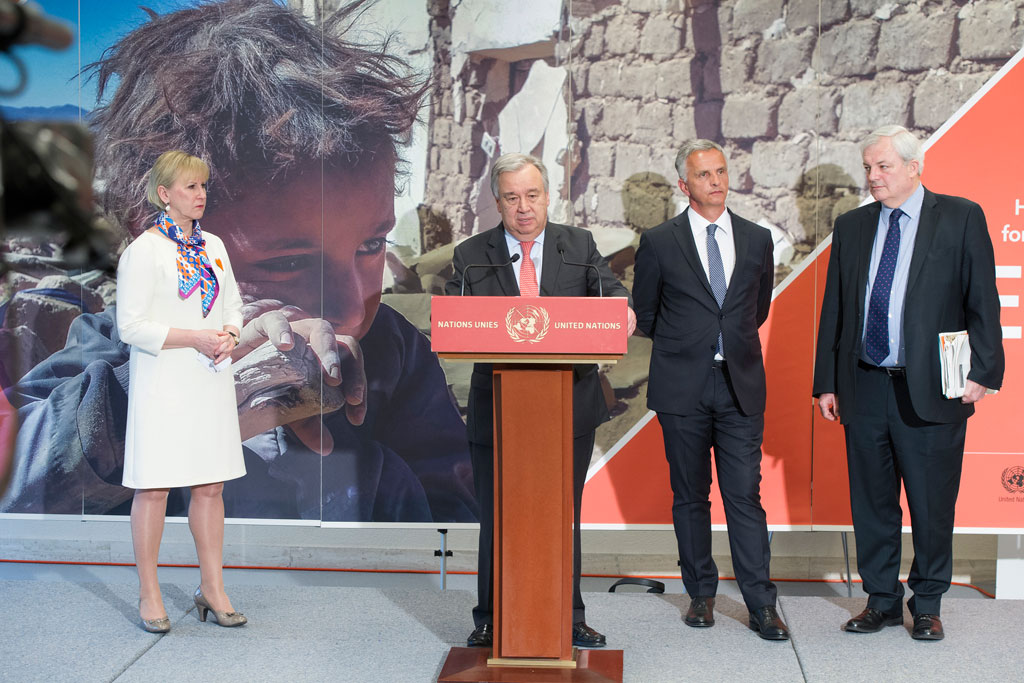Nearly $1.1 billion pledged for beleaguered Yemen at UN-led humanitarian conference
The aim was to bridge a funding gap in the 2017 humanitarian appeal of $2.1 billion. Prior to the conference, only about 15 per cent had been met.
“We are witnessing the starving and the crippling of an entire generation. We must act now, to save lives,” said Secretary-General António Guterres, who presided over the opening of the High-level Pledging Event on the humanitarian crisis in Yemen, alongside the Foreign Affairs Ministers of Switzerland and Sweden.
He noted that the “man-made crisis” had devastated the economy of a country that was “pitifully poor” even before the current conflict, and forced three million people from their homes – leaving many being unable to earn a living or grow crops.
“Some 17 million are food-insecure, making this the world’s largest hunger crisis,” Mr. Guterres said, highlighting a situation worsened by import restrictions and the destruction of port facilities.
Calling particular attention to children at risk in Yemen, Mr. Guterres said that on average, one child under the age of five dies of preventable causes every 10 minutes in Yemen.
“This means fifty children in Yemen will die during today’s conference – and all those deaths could have been prevented,” he stated.

Secretary-General António Guterres (at podium) is joined by from left: Foreign Ministers Margot Wallström of Sweden, and Didier Burkhalter of Switzerland, and Emergency Relief Coordinator, Stephen O’Brien at the press briefing in Geneva of the High-Level Pledging Event for Yemen. Photo: OCHA/Violaine Martin
According to the UN Office for the Coordination of Humanitarian Affairs (OCHA), pledges were made by 48 Member States, the European Commission, the Central Emergency Response Fund (CERF) and four NGO/humanitarian organizations for humanitarian action in Yemen in 2017. “Now we must see the pledges translated into the scaled up action the people of Yemen need and deserve,” the Mr. Guterres said.
Yemen’s next challenge: lifting restrictions on aid access throughout the country
The exact pledges for the day totalled $1,098,466,634, “a remarkable success” according to the Secretary-General, who expressed optimism at the close of the conference that the full amount required will materialize in the coming months.
The next challenge to overcome would be to lift access restrictions throughout Yemen. Mr. Guterres urged parties of the conflict to respect international humanitarian law and allow unhindered movement of humanitarian actors to reach those in need.
“Access is the key for the success of this pledging conference,” he said, calling also for the necessary infrastructure to be allowed to operate in normal conditions and for goods to be imported and distributed.
Echoing the Secretary-General’s calls for access, Under-Secretary General for Humanitarian Affairs and Emergency Relief Coordinator Stephen O’Brien noted the UN and its humanitarian partners are “scaling up and ready to do more provided there are resources and access.”
Having visited Yemen thrice over the past two years, he recalled haunting images of a 13 year old girl who now headed her household, of toddlers too sick to register their mother’s touch, and of families living with little access to food, clean water or medicines.
Both officials stressed that funding alone will not reverse the fortunes of the millions of people impacted. They called for a cessation of hostilities and a political settlement, with talks facilitated by the Secretary-General’s Special Envoy Ismail Ould Cheikh Ahmed.
‘Between famine and starvation lies disease’
More than two years of fighting has destroyed the country’s infrastructure – including attacks that targeted civilians. Some 325 attacks have been verified on health facilities, schools, markets and other infrastructure.
As the violence rose, the ability to aid those in need has been hampered. The disruption of health services has been “severe,” Margaret Chan, Director-General of the World Health Organization (WHO), told the pledging event.
Less than half of the country’s health facilities are functioning and the majority of health providers, if they stayed, have not been paid since at least August 2016.
She warned also that infections would increase as the population grows more hungry.
“Large swaths of the population are on the brink of famine,” Dr. Chan said. “Between famine and death from starvation lies disease. Infections that a well-nourished body wards off become deadly in severely malnourished people.”
She called for more services, such as vaccinations, and access to basic health services.
Avoiding famine by supporting farmers
On the sidelines of the pledging conference, Director-General of the UN Food and Agricultural Organization (FAO) Jose Graziano da Silva met with Yemeni Prime Minister Ahmed Obaid Bin Daghr to discuss aid to farmers.
During his address to the conference, Mr. da Silva noted that farming aid coupled with food assistance is the only way to avoid a famine in the country.
“Agricultural assistancein a humanitarian crisis can no longer be an afterthought,” the FAO Director-General said. “We need to seize every opportunity to support communities in Yemen to continue producing food, even under difficult circumstances.”
He stressed how livelihoods support, especially for agriculture and fishing, must be an integral part of the international community's response to the crisis in Yemen.

